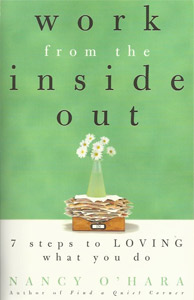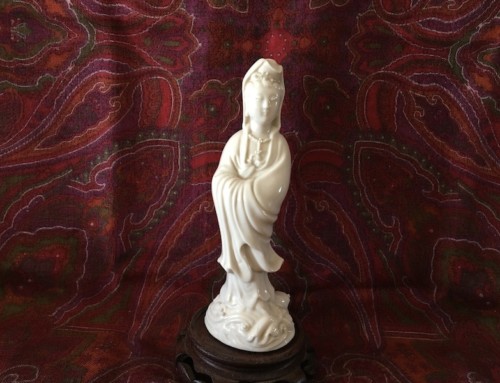…continued from Money & Spiritual Practice – Part 1
It is not money or winning the lottery but the desperate desire for them that creates our unhappiness. And the idea that money is the root of all evil doesn’t mean that when we have money like Evelyn’s or when we win the lottery we will become mean and evil and behave badly. What it means is that when we begin to crave such riches we commit acts that betray our good and true nature. We let the deep-seated and gut-wrenching desire for money compromise our own moral values. While this may seem overstated and exaggerated, how many of us have sold out for money? At first it may seem a small thing and not so devastating, but time takes its toll and eventually we become a shell of our true selves as we justify our behavior and let fear guide us.

October Supermoon
A city newspaper was recently barraged with lawsuits when it misprinted the winning numbers for a lottery-style game that it runs. Thousands of people thought they had won large sums of money. When told that they hadn’t, they got angry and hired lawyers. They lost nothing but their fantasy, a moment’s dream of riches. They were disappointed. They felt cheated. Someone had to take responsibility for that, though certainly not them. So they sued because they couldn’t let go of the idea of getting something for nothing and figured a lawsuit might give them even more easy money.
For our purposes the lottery is simply a convenient metaphor for any money fixation. It could be wanting a promotion at work simply for the bigger pay check, longing for a job, any job, that would support a lifestyle you’re sure you’d be happier in or banking all your extra money today (and denying yourself some pleasure now) so that you can retire early and finally enjoy your life. What all of these aspirations have in common is an extreme desire for money or for those things that money can buy. This yearning only serves to take us away from our real life now and project us into the unreal future. It not only prevents us from enjoying any task, it undermines our gratitude for what we have now and sows bitterness and discontentment, so that even if we are working in the field of our dreams we cannot enjoy it to the fullest and our contribution is definitely not at 100 percent.
Whenever we make money all-important and allow it to distract us from the task at hand, it is possible we will never do the work we love.
This does not mean that we should work for nothing. But when money is our first and only priority, then we are surely destined to be unhappy at work. Unlike Evelyn, most of us were not born into money and we do have to work for a living. But why does this simple reality so often turn into a tired and knee-jerk resentment? We sometimes claim to be a victim of necessity without realizing that we are our own captors. Rather than focusing on what you don’t have (the dream job, lots of money) look at what you do have. Appreciate the fact that you’re able to work at all. Challenge yourself every day to find something in your work to be grateful for. And then decide to enjoy each task as you confront it.
Once you begin to like what you do then you will be ready to do what you love.
Having money is not so terrible. In fact, it is necessary for getting along in the world and can even provide us with the means to practice charity. What is terrible is the selfish desire for money and what this desire makes us do. It may take some time to understand the distinction, but know that having money or not having money is not where your problems with money lie. It is in the craving for money or the yearning to be relieved of money troubles that we lose our perspective and let money rule our lives. So your job here is to cast away your desire for money. Then you can do your work mindfully and contentedly. And when you do, the money will come. Concentrate on the letting go. Come back again and again to this notion as you come back to your breath when sitting still. The rewards will be yours when you loosen your grip on them. This works, it truly works.
_________________________________________________
- How preoccupied are you with money? How does it figure into your enjoyment of or your dissatisfaction with work? Write about this.
- Does fear of losing what you have or not getting what you want or think you deserve influence your attitude and approach toward work? Does this motivate or stifle you? Why? Write about this.
- Write about money—what it means to you, what your parents’ values about money were, how much you make, how much you want to make, how your identity is tied into how much you make. Does money make you happy, sad, angry? Does a lack of money affect your self-esteem? This might prove to be the most difficult exercise in this book. Writing about and being honest about how we deal with, feel and think about money can be as sensitive as writing about sex. It’s very personal, it’s very intimate. And we don’t usually talk directly about it, we talk around it. So it may take a few tries here to get honest, but keep at it. This is important.
- Have you ever sold out for money? Describe the circumstances. What did you gain? What did you lose? Without slipping into remorse, write about what you could have done differently. What have you learned?
- With your opposite hand (the one you don’t normally write with) spend ten minutes writing a gratitude list. (This is an extremely important exercise, as it will not only focus you completely on the task of writing this list, engaging the half of your brain that is underused and giving you a sense of what total concentration feels like, but also bring your attention to what is most important in your life.)
- How important is money here? Did you have fun writing this list? Did it give you a new perspective on what you have in your life? Write about this.
- Write a gratitude list with your usual hand. How does this list, and the experience of writing it, differ from exercise 5?
- Repeat exercise 5 any time money and the pursuit of it dominates your thoughts, any time the desire for more or the fear of loss preoccupies you, and each time you want a new perspective on something. Consider writing this list for five minutes at the end of each day to take stock of the gifts you have.
_________________________________________________
To be continued…
from Work From the Inside Out – 7 Steps to Loving What You Do






Leave A Comment